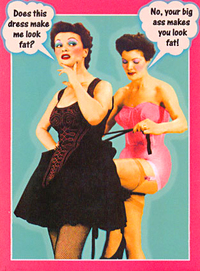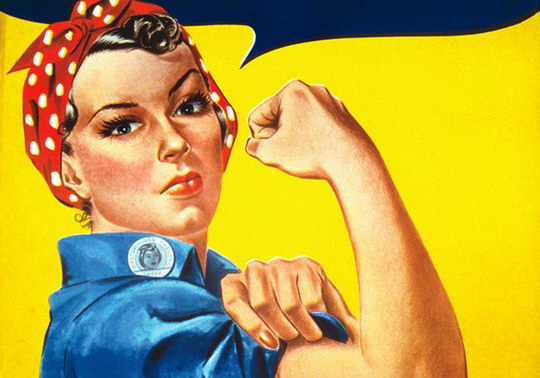 Well, that’s what researchers say:
Well, that’s what researchers say:
It’s almost inevitable: When women get together, the chatter eventually turns to whose skinny jeans don’t fit anymore and who weighs in heavier on the scale. And participation is socially mandatory, a new study finds.
Socially "mandatory"? Who enforces this?
Researchers call this "fat talk", a term coined to describe a behavior common in middle school-aged Caucasian females. But the phenomenon seems to occur in older females as well.
"We have found in our research that both male and female college students know the norm of fat talk — that females are supposed to say negative things about their bodies in a group of females engaging in fat talk," said study co-author Denise Martz of Appalachian State University.
Okay, I’m actually buying this a little.
And here’s the part that really sold me:
"Females like to support one another and fat talk elicits support," Martz said. "An example would be one saying, ‘It’s like, I’m so fat today,’ and another would respond, ‘No, you are not fat, you look great in those pants.’"
Fat talk also allows females to appear modest, a prized quality in a culture that shuns egotism.
"We tend to dislike arrogance and especially dislike it in women (‘bitches’)", Martz explained. "Women are perceived as OK if they fat talk and acknowledge that their bodies are not perfect but they are working on it."
The lesson being (for you clueless guys out there), that when a woman asks "Do these jeans make my ass look fat?", you are supposed to answer "no". This is called "fishing for support", you see, and it’s socially mandatory.
On the one hand, I can certainly understand the psychological factors behind self-deprication in order to solicit support. On the other hand, if the phenomenon is so obvious and transparent, how supporting is the "support"? I mean, don’t women know they’re being, well, lied to?
Take a relook at the scenario above. Now, when the second women responds "No, you are not fat, you look great in those pants", doesn’t the first women know that the second woman is just saying that, because it’s socially mandatory? I suspect so. In fact, the first woman will probably then say, "Oh, you’re just saying that", a social prompt for the second women to offer further support with "No, no. I really mean it."
And so it goes.
I wonder what would happen if the second woman, instead of saying, "you’re not fat in those pants", said "Actually, you do look kind of fat in those. Why don’t you try on this outfit, because they really accentuates your beauty?" Now, tell me, social mandatory cops — what’s wrong with that response? It’s supportive AND honest. It’s also when you know you have a true friend.
Amanda Marcotte, I notice, isn’t exactly keen on this socially mandatory thing either:
The fact that hating your body is considered basic good manners for a woman makes it all the much harder to get over self-degrading talk, I think. Just as you automatically say, “Excuse me,” if you belch or automatically smile and laugh when someone says something meant to be pleasing, this sort of self hate becomes second nature.
Yup. It’s understandable why women do this, but it is unfortunate.
Amanda, by the way, goes one step further, and points to research showing that men check out other men more than women do, as a way to size themselves up. Research which tracks eye movement shows that when given a picture of a baseball player, women’s eyes gaze on the face, but men (yes, straight men) looked at his crotch almost as much as his face:

I can’t speak for the men in this study. All I can say is that if I had been a subject in this study, my data point would have been an outlier.
Not that there’s anything wrong with it…..

